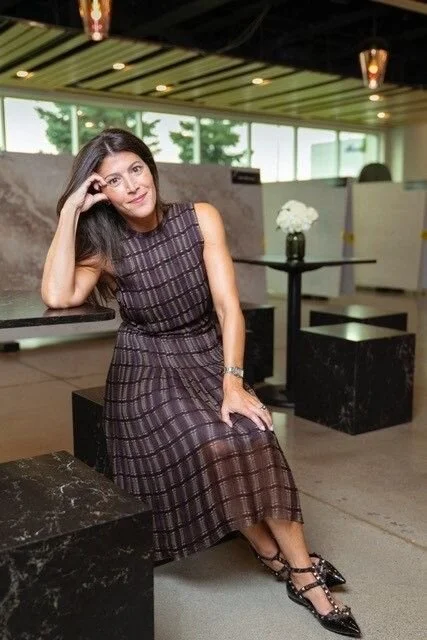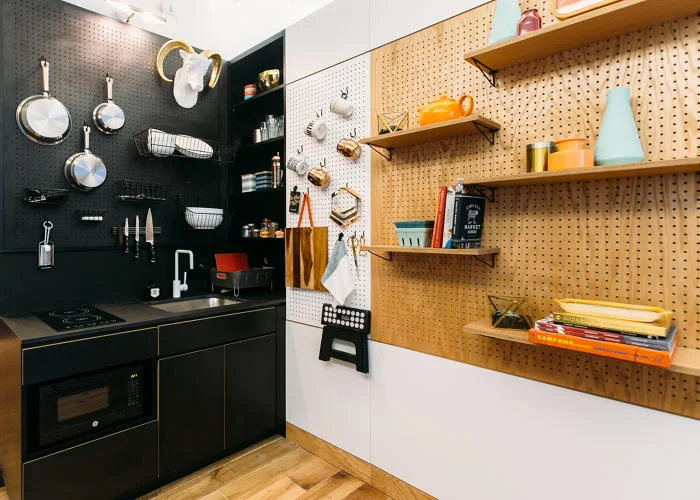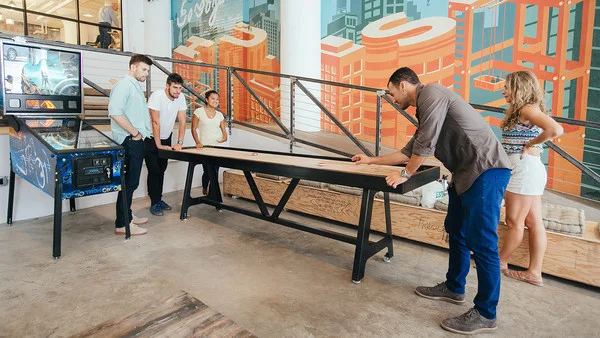Last month, WeWork hit a $16 billion valuation. That’s billion. With a “b”. The valuation reflected a 53% growth in appraisal, and the colossal coworking space is expected to raise even more money in the near future. Although many people have mixed feelings about WeWork, the company is proving there is robust appetite for coworking spaces throughout the country. Even GE moved some of its company into a WeWork. While coworking isn’t quite right for all companies, the office alternative is proving to be a sustainable option for many growing companies.
Startup Ensures You Will Never Be Tired Of Your Office Space
If you ever tried to find a table for four or more at a local coffee store to work on a group project or a startup idea, you know it is not an easy task. If you finally manage to Tetris your way out of rearranging chairs and tables, you are still met with annoyed glances from the barista behind the counter. Founded by four friends who were faced with this very problem, Croissant has an answer for all those in need for office space, but who either cannot afford or do not want to commit to a co-working space.
A Coworking Space Where You Pay Rent With Content
Blogfabrik, is a Berlin-based coworking space, that in exchange for two contributed articles a month will give freelancers a desk to work from. The articles are for Blogfabrik’s online publication DailyBreadMag which is marketed toward 18-35-year-olds. Freelancers are asked to promote the pieces they contribute through their personal social media channels and organize one event for the publication over the course of the year.
Flexible Workspaces Improve Urbanism
Much has been said about flexible workspaces as it relates to work-style, but little has been said about them in regards to how they help improve a city or neighborhood. Flexible workspaces are all about providing workers with an option and a solution that adapts to their working needs. This goes from offering different rates and packages (hourly, daily, weekly, monthly, yearly), to also offering them with the option of where local business owners and local entrepreneurs want to work from.
Three Trends to Watch in the Shared Office Industry in Asia
A new report from Compass Offices has identified three key trends in the shared office industry in the leading Asia Pacific markets – Hong Kong, China, Australia and Singapore. These trends are emerging against a backdrop of continuing economic development in the region. Despite the current economic uncertainty, the Asia Pacific region is set to become the largest contributor to the global economy by 2020, with a projected rise of inward investment in several key markets.
The new corporate workplace: Beers on tap, bring your dog to work and a short-term lease
When co-working firm Cross Campus opens an office in downtown Los Angeles next month, its tenants will include the typical start-ups looking for collaborative work environments, shared coffee bars and the flexibility of a short-term lease. But the 33,000-square-foot location on Wilshire Boulevard also will house businesses of a less typical variety, including real estate developers, legal firms and FactSet Research Systems Inc., a publicly traded financial data company out of Connecticut with more than 8,000 employees worldwide.
Incubator Spaces, Innovation Hubs – How to Design Workplaces for Big Ideas
Innovation isn’t just a buzzword. It’s a requirement for survival in today’s hyper-competitive marketplace. Not surprisingly, businesses of all scales – from start-ups to corporations – spend great capital and focus on increasing innovation in their organizations. Whether it’s disruptive innovation that changes the marketplace entirely, or incremental innovation that improves one product from another competitors’ offerings – innovation is fuel in the business world. In order to best instill an innovative culture, companies should consider the design of their office spaces and how they’re engineered to naturally spur the type of creative thinking that can turn an idea into a scalable innovation. It’s not enough to simply find an empty room and re-name it a think tank, incubator or hackerspace. Energizing the innovative spirit in an organization via design requires concrete strategies and intentional efforts – and there’s no one-size-fits-all solution.
How the Staples/Workbar Partnership Will Become the #2 Coworking Force In the Country
We’ve seen the meteoric rise over past few years in every major city across the country. The service has now become available in just about every metropolitan market and just keeps going. Freelancers, entrepreneurs, and startups have long sung the praises of working these highly charged environments. Development teams execute critical sprints in the conference rooms. Companies hold the sales meeting/ product seminars in the open spaces. Personally, I find that my drive factor goes into hyperspace when I drop in at one of these facilities when I’m working in NYC. (LMHQ is my haunt of choice). You just feed off the environment.
Most office spaces are a lot more boring than you’d think
If you’re reading this article from a desktop computer in an enclosed cubicle — nary a pingpong table in sight — you’re probably not alone. Despite the media’s appetite for hip organizations with open floor plans, foosball tables, and beer on tap, most offices are pretty boring, according to a new Global Workplace Report by office furniture company Steelcase.
BMW to Open Co-Working Space in Former Home of Brooklyn Night Bazaar
BMW is hoping to tap into north Brooklyn's creative economy by opening co-working offices, a restaurant and event space aimed at the area's design professionals. A/D/O, billed as a "place for design professionals to work, develop and play," will open late this summer at 29 Norman Ave., taking over the massive warehouse that was once home to the Brooklyn Night Bazaar.
Trends Poised to Disrupt Commercial Real Estate in 2016: A Recap of the 2nd Annual Disrupt CRE NYC
The idea of sustainable space is evolving. “Airbnb opened up a new category of hospitality, the same thing is happening in office space,” said LiquidSpace‘s CEO Mark Gilbreath. This generation has gained the sense that anyone can be successful, and individuals have power over their own economic trajectories. As Michael Gross, Vice-Chairman of WeWork, remarked about our generation’s entrepreneurial attitude: “that’s not changing.”
A First Look Inside WeWork's New "Coliving" Spaces
In January, Fast Company broke the news that the coworking startup WeWork was beta testing its first "coliving" spaces in New York. Today, the company is opening the space—a residential extension of its community-centered office spaces—to the public for rent.
Staples Finds New Use for Its Stores: Office Space
Staples Inc. has found a new use for some of its roomy office-supply stores: make parts of them into offices. The retailer is joining other chains including Sears Holdings Corp. and Macy’s Inc. that have carved off sections of their stores to other companies in an effort to improve store productivity and to give shoppers, increasingly tempted to buy online, another reason to stop by.
Why Coworking is More Than Just an Office Space
Today’s technology allows people to work from just about anywhere — a home office, Starbucks, or even the comfort of your couch. However, what’s often missing is the face-to-face interaction that a professional office provides. (Not to mention it’s tough to conduct business in a noisy coffee shop). The solution? Coworking, which is a popular trend among freelancers, entrepreneurs, and startups -- and now even large corporations.
Why Corporations Should Be Coworking
Looking for real estate in NYC to expand or move your office can be a daunting task. From the largest of corporations to small startup teams, moving is an unavoidable growing pain. A simple solution is to use coworking spaces during these times when you need extra office space and possibly as a permanent solution. Many corporate employees find the coworking environment to be exciting and energizing because they are exposed to new surroundings, additional networking opportunities, and new people. Working alongside startups and innovators can be extremely motivating for corporate employees not used to being around such an exciting environment.
Coworking spaces not just suited to start-ups with Millennial occupants
The rise in popularity of coworking spaces has been largely attributed to growing demand from creative and tech start-ups for shared workplaces that are cost-effective alternatives to traditional office leases. But there’s new evidence from the US that coworking spaces could also be eminently suitable even for larger occupiers, and especially in costly metro areas such as New York, San Francisco, Los Angeles and Boston. According to a new report from CBRE Group a number of misconceptions that have perhaps kept larger occupiers away from extensive use of coworking facilities do remain, including that this type of space is priced at a premium compared with traditional leases; that it is only utilized by entrepreneurs and small businesses; and that the users are exclusively post-college millennials. Yet CBRE’s report found that these assumptions are not accurate.
Adam Neumann's $16 Billion Neo-Utopian Play To Turn WeWork Into WeWorld
A Beatles chorus bounces off the bare concrete walls of what was once J.P. Morgan’s headquarters. "Come together, right now." The nearly 1,000 chattering WeWork employees who fill the event space look toward the stage, expecting CEO Adam Neumann to appear from the wings any second now. Instead, he sprints down the center aisle, and giddy conversations evolve into a cheer. When John Lennon trills "Over me," Neumann leaps onto the stage, sticking the landing.
ON THE GLOBAL EXPLOSION OF COWORKING
Last year the Global Coworking Unconference Conference (GCUC; pronounced “juicy”) expanded outside of the U.S. to Canada, Australia, and China, and this year, they expanded to South America. We reached out to Liz Elam, GCUC’s executive producer, to get the scoop on the state of the industry on the heels of GCUC’s first conference in Sao Paulo, Brazil. Here she, and a handful of colleagues, share thoughts on how coworking is spreading around the world.
Let the good times roll for co-working office ventures
The walls are exposed brick, Apple laptops ubiquitous, the drinks ordered via iPad, the outfits casual. There may be faux-industrial lighting or leather sofas; there will most likely be talk of a creative community. From San Francisco to Berlin and from Nairobi to Bangkok, the scene is an increasingly familiar one: an office in which companies — especially small technology firms — share ideas and flat white coffees along with a workspace.
Co-Working Spaces Delve Into Design, and Tenants Want In
Less than a year ago, when Commercial Observer put WeWork’s Co-Founders Miguel McKelvey and Adam Neumann on its list of the 100 most powerful players in real estate, their company’s shared workspace empire had been valued at a staggering $5 billion. But that was then. More recently, the company was reassessed, and the powers-that-be at Fidelity Investment decided that WeWork was worth another $10 billion on top of that.

























